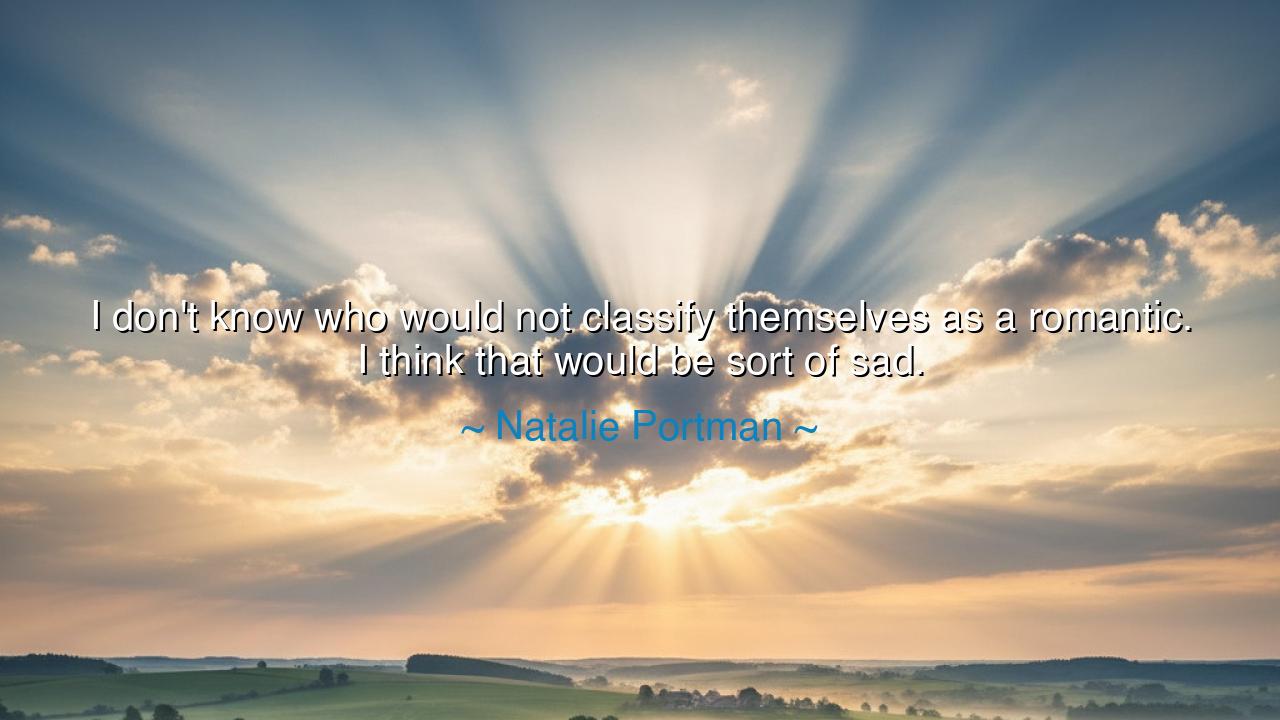
I don't know who would not classify themselves as a romantic. I
I don't know who would not classify themselves as a romantic. I think that would be sort of sad.






In the words of Natalie Portman, we hear a gentle but profound truth: “I don’t know who would not classify themselves as a romantic. I think that would be sort of sad.” This statement is more than a passing reflection—it is a defense of the spirit that believes in beauty, in love, in wonder. To be a romantic is to affirm that life is more than a chain of duties and survival, that within the human heart lies a flame longing for connection, for passion, for poetry. Without that flame, the world becomes gray and cold, a place of logic without song, of bread without joy, of existence without meaning.
The ancients understood this well. They wove tales of gods and mortals, of heroes and lovers, not merely to recount history, but to remind themselves that the universe was alive with longing. The myths of Orpheus and Eurydice, of Paris and Helen, of Antony and Cleopatra, all speak to the power of desire that transcends reason. A romantic soul does not always choose the safest path, but it chooses the path that affirms the greatness of being alive. Thus, Portman’s words call us to honor that part of ourselves which still dares to dream, to hope, to love—even at risk of heartbreak.
Yet there are those who reject romance, who bury their yearning beneath cynicism, disappointment, or fear. These are the ones who, perhaps wounded by the world, close the gates of the heart and seek safety in detachment. To such souls, Portman’s lament is directed—it is sad, she says, to deny one’s own romantic nature, for it is to deny a part of being human. Without romance, we shrink into shadows of ourselves, creatures who live but do not truly feel.
Consider the example of John Keats, the great Romantic poet. Though his life was short and filled with illness, he poured his soul into words that celebrated love, beauty, and longing. He declared that “a thing of beauty is a joy forever,” even as he knew he would not live to see old age. His willingness to remain a romantic, to see beauty even while death drew near, has made his poetry immortal. Had he chosen cynicism, his words would have vanished with him. Instead, his faith in romance has outlived his fragile body.
There is also the story of Mahatma Gandhi, though not a poet in the traditional sense, who lived as a romantic of the spirit. He believed against all odds that truth and nonviolence could conquer empires. To many, such belief was naïve, unrealistic. But to Gandhi, it was the essence of life—to love with courage, to hope with defiance. His vision was not born of cold calculation, but of the romance of faith in humanity. And in this, he proved that a romantic heart can shape the destiny of nations.
The lesson for us is clear: do not deny the romantic within you. To love is not weakness. To dream is not foolishness. To hope for beauty in a broken world is not naïveté—it is strength. For it is only those who dare to be romantic who create art, who fall in love, who build movements, who change the course of history. To scorn romance is to scorn the very essence of life’s wonder.
Practically, this means embracing the small acts of romance each day. Write words of affection to those you love. Seek beauty in nature and art. Do not be afraid to believe in the unseen, in the possibilities of the heart. Resist the temptation of cynicism, for though it shields you from disappointment, it also robs you of joy. Choose instead to live with open eyes and an open heart, knowing that heartbreak itself is proof of having lived fully.
And so, let Natalie Portman’s words be carried as wisdom: to be a romantic is to be fully human. Do not let the world’s disappointments harden you into silence. Instead, sing, love, hope, and dream, even when the outcome is uncertain. For the saddest fate of all is not to fail in love, but never to have loved at all.






AAdministratorAdministrator
Welcome, honored guests. Please leave a comment, we will respond soon